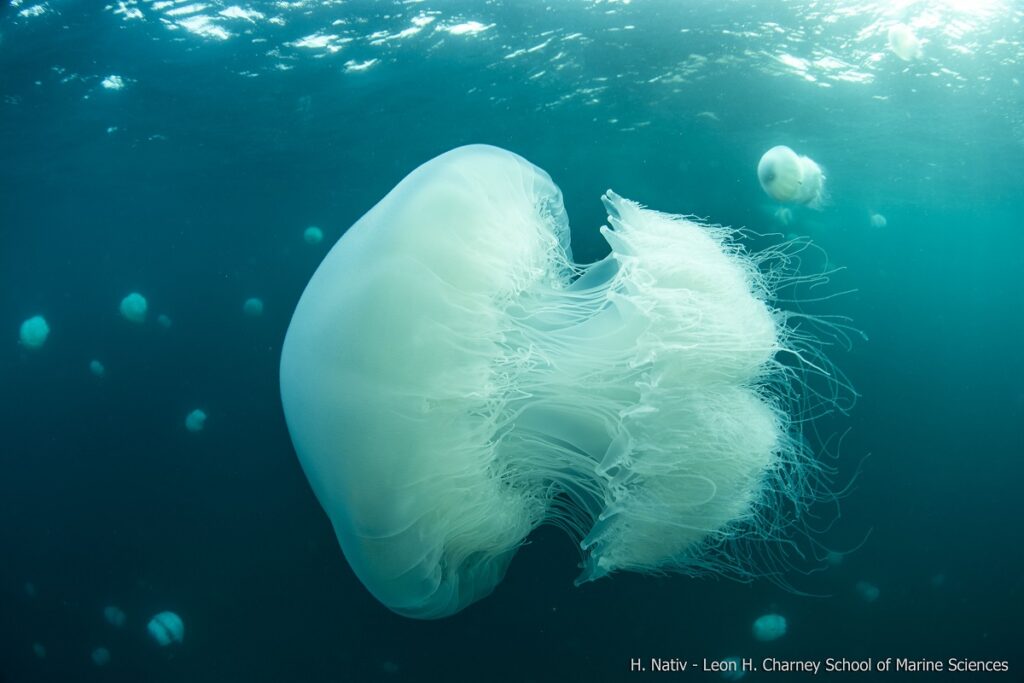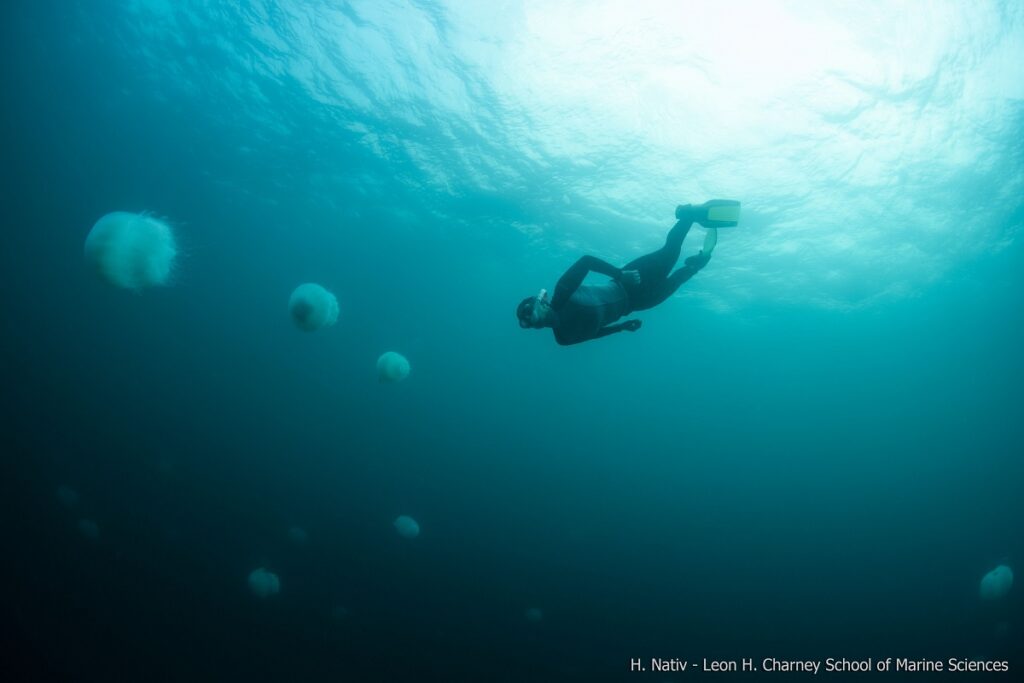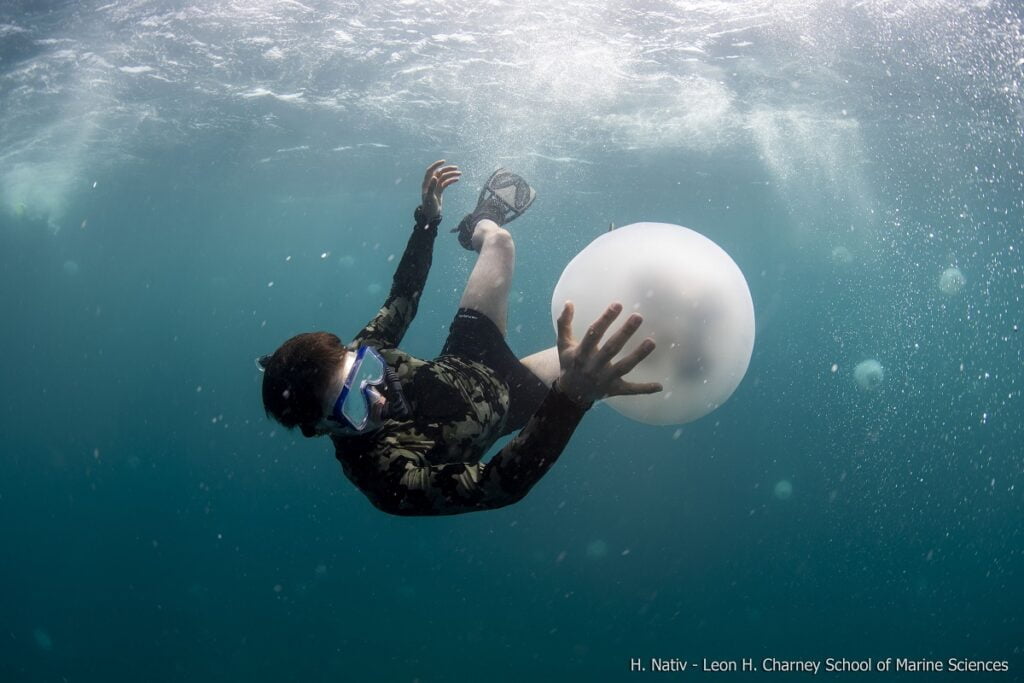Every year, in the scorching Israeli summer, beachgoers start counting down to jellyfish season — that time of year when the pesky, fear-inducing sea creatures suddenly swarm the waters and wash up ashore, terrorizing swimmers in their path.
There’s even a website to track where they are.
This year, in one part of the country, those jellyfish are “larger than ever,” according to researchers at the University of Haifa’s Leon H. Charney School of Marine Sciences.

“Overall, this is the summer bloom of jellyfish that we anticipate, but there’s a slight difference in the size of jellyfish — on average, they’re bigger this year than in other years,” explained University of Haifa Professor Dror Angel in a university statement on Sunday.
The university’s marine researchers have been studying the ecology and life cycle of the jellyfish and noticed that a “huge swarm” had appeared off Haifa’s coast.
While the marine researchers nixed the idea of the coronavirus pandemic as a factor in the larger-sized jellyfish, Prof. Angel did note that “rainy winters this year and the runoff that reached the sea provided a lot of nutrients that contributed to the formation of the jellyfish bloom,” he said.
“The nutrients feed the algae; the algae bloom and are eaten by small plankton herbivores, and these are then eaten by the jellyfish,” he added.
Prof. Angel and his team also insist nature is the “bigger player” in explaining the unusual size of these jellyfish. “We’re looking at cues like changes in temperature, as these probably play a role in determining when jellyfish appear,” he said.
Prof. Angel also said the researchers haven’t identified human-driven factors, like pollution, which could also be affecting the blooms.
“At the moment, we think natural phenomena have more of an impact than human effects,” he explained.
The University of Haifa’s Leon H. Charney School of Marine Sciences has increasingly pursued groundbreaking maritime research with practical applications, including innovative research on jellyfish.
Sign up for our free weekly newsletter
Subscribe
Two years ago, Prof. Angel led a team of researchers as they looked into how jellyfish could be used to isolate microplastics in seawater and ocean water by creating a filter made of jellyfish mucus. The research was part of the Go Jelly project, an international consortium of technology developers, business analysts, fishing companies, research institutes, and scientists working with a number of universities and research centers worldwide to “promote a gelatinous solution to microplastic pollution.” The project is currently funded by the European Union’s Horizon 2020 research and innovation program.
SEE ALSO: Could Jellyfish Help Rid Our Waters Of Plastic Waste? Israeli Scientists Are On It
Since January 2018, Prof. Angel and his team have looked closely at the role of jellyfish-produced mucus and whether it could be used as a trapping agent to develop a filter for use in wastewater treatment plants and industrial processes to dispose of waste.
Jellyfish in the Mediterranean Sea have shown to produce an unusually large amount of mucus, which is promising for the development of a future filter, Prof. Angel told NoCamels at the time.
The research team had gathered a number of various plastic particles and removed a large number of jellyfish from the water and testing.
The research continued in 2019, when Prof. Angel said that the mucus could be manufactured into two potential products – a sticky mesh that would filter out plastic particles, or a chemical powder that to be added to treated wastewater, according to The Media Line. He also focused mainly on creating a product that would work for waste-water treatment plants.
Jellyfish are known to be a general nuisance to swimmers and beachgoers across the country as bumping into one can cause them sting and inject venom into their prey, which for human typically result in pain, discomfort, and, in extreme cases, even death.
SEE ALSO: How Israel Became An Unlikely Shark Research Hub, According To A Marine Ecology Expert
The first jellyfish sightings this summer were reported earlier this month along Israel’s southern coastline by the Israel Oceanographic & Limnological Center, which is responsible for informing the public of jellyfish activity along Israel’s shoreline.
Related posts

Resilient And Nutritious New Plant-Based Milk Aims To Make A Splash

Chocolate From Cultivated Cocoa Comes Without Environmental Toll

Plastic Fantastic: Startup Takes PVC Back To Its Crude Oil Roots




Facebook comments